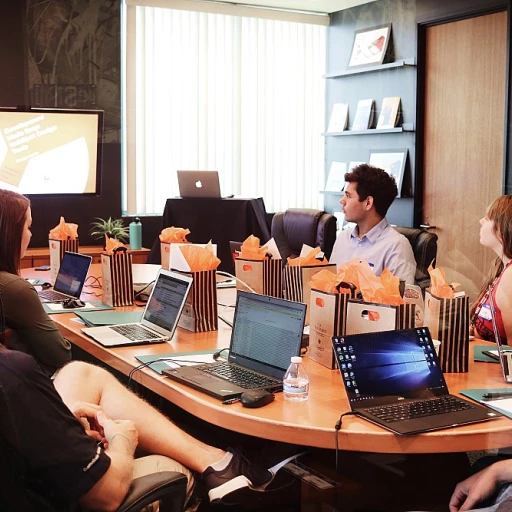
The Core Responsibilities of an Onboarding Specialist
Understanding Core Responsibilities
Navigating the world of an onboarding specialist involves a unique blend of tasks and skills. At its core, the specialist's role is defined by a range of responsibilities essential for ensuring that new hires transition smoothly into their roles within the company. The onboarding process itself encompasses various stages, from initial introduction to full integration into the workplace environment. Here’s a closer look at what this involves:- Design and Execute Onboarding Programs: Tailoring the onboarding experience to align with company policies and culture is crucial. Specialists create comprehensive programs that meet the specific needs of both the company and its new employees, ensuring all required training and documentation are delivered efficiently.
- Act as a Liaison: As business partners, onboarding specialists bridge the gap between human resources and new team members. They help facilitate clear communication, answer questions, and direct new hires to appropriate resources, playing a key role in the overall management of new employee relations.
- Track Progress and Gather Feedback: A successful onboarding journey relies heavily on ongoing assessment. Specialists must track the progress of new hires, adjusting processes as necessary to enhance effectiveness and collecting feedback to further improve the onboarding experience.
Key Skills for Success in Onboarding
Essential Competencies for Excellence in Onboarding
An onboarding specialist plays a pivotal role in shaping an employee’s initial perception of a company. As such, possessing the right skills is crucial for the job. Effectively managing the onboarding process requires a blend of technical and soft skills, tailored to improve the employee onboarding experience and facilitate seamless integration into the team.
Communication Skills: Since onboarding specialists interact with new hires and other team members, strong communication abilities are indispensable. Clear, empathetic, and proactive communication is needed to explain company policies, job descriptions, and other key information during the onboarding process.
Organizational Skills: Managing multiple onboarding processes simultaneously demands an exceptional level of organization. Specialists must adeptly handle an array of tasks, from conducting company orientations to managing employee resources, ensuring each new hire’s transition is smooth and insightful.
Technical Proficiency: Familiarity with onboarding technologies, such as Human Resources Management Systems (HRMS), is required to automate and streamline the onboarding process. Knowledge of digital tools can greatly enhance the onboarding experience, boosting efficiency and ensuring a positive start for new employees.
Adaptability: The business environment is dynamic, requiring onboarding specialists to be adaptable to changes in company guidelines or industry standards. Flexibility allows these professionals to update processes efficiently, maintaining relevance and effectiveness.
Problem-Solving Abilities: Onboarding specialists often need to navigate unexpected challenges, from addressing employee queries to adapting onboarding strategies. Effective problem-solving is vital to mitigate any issues that might arise during the onboarding journey.
For more insights into enhancing user engagement through onboarding, consider exploring strategies that focus on effective onboarding methods that help craft a smooth transition for new employees.
The Impact of Onboarding on Employee Retention
Enhancing Retention with Successful Onboarding
Ensuring a seamless onboarding process can significantly impact employee retention in an organization. Onboarding specialists play a vital role in molding new hires’ initial business experiences, which can greatly influence their decision to stay with the company long-term. When specialists craft an effective onboarding experience, they contribute to cultivating employee satisfaction and loyalty.
An effective onboarding process not only acquaints employees with their job roles and company policies but also creates a welcoming atmosphere that helps new team members swiftly integrate into the organizational culture. By providing adequate training and resources, onboarding specialists lay the groundwork for new hires to feel valued and supported, which subsequently enhances their job satisfaction.
Moreover, onboarding plays a crucial part in boosting engagement. With the help of professional onboarding management, specialists ensure that employees understand their key responsibilities and have the necessary tools to succeed. This clarity and support enable employees to perform their roles with confidence and deliver greater value, both to the company and its customers.
Research has shown that employee onboarding can improve retention rates by up to 25%, illustrating why it is an indispensable part of human resource management. By focusing on delivering a personalized and supportive onboarding journey, specialists help businesses retain valuable talent and avoid the costs related to high turnover.
For a deeper dive into enhancing retention through strategic onboarding, the article Enhancing the Role of the Customer Success Team in Onboarding explores the critical interplay between onboarding specialists and customer success teams, outlining how a collaborative approach can further elevate the onboarding experience.
Challenges Faced by Onboarding Specialists
Overcoming Obstacles in the Onboarding Journey
Onboarding specialists play a pivotal role in shaping the employee onboarding process, but they face numerous challenges in their specialist job. These obstacles can impact not only the onboarding experience but also the overall success and retention of employees within the company. Here's a closer look at some of the common challenges faced by onboarding specialists:
- Lack of Integration: Often, onboarding processes are not seamlessly integrated with other human resources functions, leading to fragmented experiences for new employees. Specialists must work closely with HR management to ensure a cohesive process from recruitment through to training and beyond.
- Limited Resources: Companies frequently grapple with resource constraints, which might restrict the onboarding program's effectiveness. Specialists need to be adept at maximizing available resources while creatively addressing any resource challenges.
- Ensuring Engagement: Keeping new hires actively engaged and motivated from day one can be difficult. Crafting interactive, engaging onboarding sessions that capture employees' interest is crucial for onboarding specialists.
- Alignment with Company Policies: Ensuring new employees understand and adhere to company policies is another hurdle. Specialists must ensure policies are communicated clearly and that employees are well-versed in compliance matters as they join the team.
- Technological Integration: As various tools and technologies play a key role in the onboarding process, specialists often encounter challenges related to tech onboarding. Ensuring new hires are comfortable with the necessary digital tools requires patience and effective user onboarding techniques.
Addressing these challenges requires a strategic approach and a deep understanding of the onboarding domain. Onboarding specialists must leverage their skills and expertise to create bespoke strategies that cater to the specific needs of their company and employees. They function as valuable business partners, ensuring the onboarding experience is not only smooth but also aligned with the company's long-term goals.
Tools and Technologies for Effective Onboarding
Utilizing Technology to Enhance Onboarding Effectiveness
In today's fast-paced business environment, the effective use of tools and technologies can significantly improve the onboarding process. As onboarding specialists seek to streamline the experience for new hires, technology plays a pivotal role in ensuring a seamless transition into their new roles. Here's a look at some of the tools and technologies that are shaping the onboarding landscape:- Applicant Tracking Systems (ATS): These systems help in organizing and managing job candidates as they move through the hiring process. They ensure that the transition from a potential hire to an onboarded employee is smooth, providing a centralized location for all candidate-related data.
- Onboarding Software Platforms: Specialist onboarding software offers a dedicated solution for streamlining tasks such as paperwork completion, training schedules, and welcome messages. Platforms often include features for user onboarding by guiding new employees through company policies and their initial tasks effectively.
- Learning Management Systems (LMS): Education and training are crucial parts of onboarding. An LMS offers new employees a custom path for learning about company values, roles, and expectations, which is essential for employee onboarding. These systems can store resources and training materials, accessible anytime by employees.
- Human Resource Management Systems (HRMS): A comprehensive tool that assists with managing employee data, processing payroll, and maintaining records, thus supporting the onboarding process. Some systems integrate onboarding-specific features that simplify movement within human resources management.
- Communication and Collaboration Tools: Tools like Slack or Microsoft Teams facilitate communication between new hires and current team members. They're essential for creating an engaging onboarding experience, allowing easy exchanges of information, and clarifying interview questions or other concerns.
- Automated Process Management: Automation tools reduce the burden of repetitive tasks, such as sending reminders or completing standard forms. This allows onboarding specialists to focus on building personal connections with new hires.
Future Trends in Onboarding
Exploring the Future of Onboarding Practices
The landscape of onboarding is continuously evolving, and staying ahead is essential for both onboarding specialists and companies. Here are some emerging trends that will shape the future of onboarding:- Enhanced Technology Integration: Companies are increasingly leveraging technology to optimize the onboarding process. Tools like AI-driven platforms can streamline repetitive tasks, allowing onboarding specialists to focus more on creating a personalized experience for new hires. Virtual reality and augmented reality are also being explored to offer immersive training experiences.
- Personalized Onboarding Journeys: As companies recognize the diverse needs of their employees, there's a noticeable shift towards tailoring onboarding processes to individual roles and responsibilities. This approach not only engages employees but also aligns with specific job requirements, enhancing overall job satisfaction from the outset.
- Emphasis on Employee Experience: The role of onboarding extends beyond imparting company policies and descriptions. There's a significant focus on improving the overall onboarding experience, ensuring that it contributes positively to employee retention and engagement. The goal is to foster a sense of belonging and loyalty from the first day.
- Holistic Integration Approaches: Future onboarding practices will likely incorporate a more comprehensive integration of new hires into both the company culture and their respective teams. This includes not only introducing them to their immediate roles but also helping them understand the broader corporate landscape and cultivating relationships with key team members and business partners.
- Analytics and Feedback Mechanisms: As with many areas of business, data analytics is becoming essential in onboarding. Regular feedback collection and analysis can provide insights into the effectiveness of onboarding strategies, helping specialists and HR teams to refine their processes continually.












